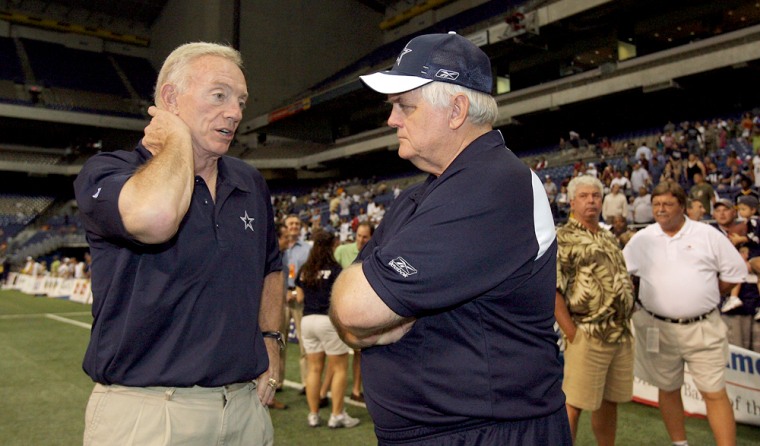The architect of modern-stadium economics and owner of the Dallas Cowboys will unleash a $1 billion stadium (financed with a mix of private and public money) in 2009 that will have other NFL owners begging for mercy.
Thanks to their new stadium, which Jerry Jones will operate, the Cowboys are now worth $1.5 billion, putting them atop the NFL team value rankings for the first time in eight years and making Dallas the most valuable sports franchise in the world. The owners of teams like the Buffalo Bills, Atlanta Falcons and Jacksonville Jaguars have been moaning that the several million dollars they get each year in aggregate from richer teams like Dallas, Washington and New England is insufficient to keep them competitive. Well, wait until Ralph Wilson, Arthur Blank and Wayne Weaver see the Cowboys' new stadium.
The new monster facility in Arlington, Texas, has over 200 suites leasing for more than $350,000 a year. Stadium sponsorships should bring in another $50 million. These numbers are important, because in the NFL, national television, ticket and licensing revenue is shared equally among the 32 teams, but the home team keeps all the suite and stadium sponsorship money.
Yes, the NFL's salary cap limits player salaries to 57 percent of league revenue. But teams can end-run the cap by paying big signing bonuses that get amortized over the life of the contract. With their new stadium, the Cowboys will have a lot more money than their rivals to lure players with fat signing bonuses — and Jones, who is already worth more than $1 billion, will see his bank account swell.
Sure, New York's Giants and Jets are going to share a new $1.3 billion stadium scheduled to open in 2010. But it is unlikely they will get as much money splitting revenue from an open-roof stadium in New Jersey that Jones will get from a retractable-roof building in Texas. Jones also has less debt tied to his stadium because of $325 million in taxpayer subsidies. The Giants and Jets got nothing from taxpayers for their stadium.
Another plus for Jones: Surrounding the new stadium will be Glorypark, a residential, retail and office complex that will keep the buzz and money flowing all year. Also, with deft maneuvering, Jones already got the league to let his stadium host the 2011 Super Bowl.
But there is no reason to pity the other 31 owners. The NFL is still the richest sports league in the world (the average team is worth $957 million, 7 percent more than last year) as well as the most profitable (mean operating income in 2006 was $17.8 million on $204 million in revenue). Although its television ratings have slipped over the past decade, the NFL still beats the daylights out of other prime-time programming, including every other sport. Nearly three out of four Americans watched an NFL game on television last season. This explains why the league's money tree will keep growing: the 2006 season marked the beginning of six-year contract extensions with the three major networks — a $3.7 billion deal with CBS, a $4.3 billion deal with Fox and a $3.6 billion deal with NBC — that award the NFL with an average of $2 billion a year until 2011.
(MSNBC.com is a joint venture of Microsoft and NBC Universal News.)
Perhaps the best example of the value of NFL programming: Last season, ESPN decided to pick up Monday Night Football coverage after its sister company ABC punted on it, tossing another $1.1 billion at the league for eight years, more than double per year what its parent had been paying. Stadium sponsorship and advertising has also developed into a big business for some owners, with teams like Dallas, Houston, New England, Philadelphia and Washington generating over $20 million a year. NFL sponsors also sank a record $1 billion into media and marketing support behind NFL-themed ads and promotions.
Will broadcasters and corporate sponsors get a good return on their investments in the NFL? No one knows. But you can be sure that whatever they earn, it will be nowhere near as good a return as Jerry Jones is going to get from his new stadium.
